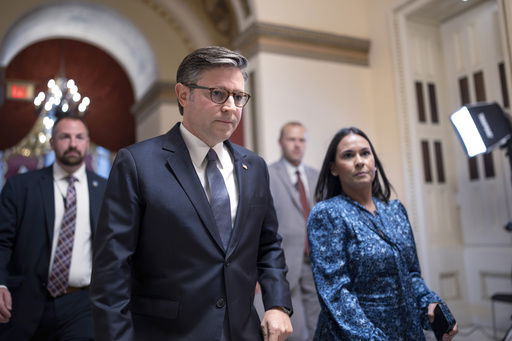Looming Government Shutdown: Capitol Hill’s High-Stakes Negotiations
As the end of September approaches, Congress faces the daunting prospect of a federal government shutdown. Both Republican and Democratic leaders are firmly entrenched in their positions, creating a scenario rife with tension and uncertainty for millions of Americans who depend on government services.
Republican Leaders Prepare to Push Back
Republican leaders are poised to confront the Democrats’ demands head-on. Spearheading this effort is House Speaker Mike Johnson, who indicated a readiness to bring a short-term spending bill to the floor for a vote as early as this week. This temporary funding measure would aim to ensure the federal government remains operational when the new budget year commences on October 1. While this bill is intended to be a straightforward patch, it is expected to extend only until mid-November.
In a pressing context, Johnson has emphasized the need for enhanced security for lawmakers following recent violent incidents, including the assassination of conservative activist Charlie Kirk. This added dimension highlights how safety and security have become intertwined with budget discussions, as Johnson assured Congress members: “They will be kept safe.”
Democrats Stand Firm on Health Care Funding
On the opposite end of the spectrum, Democrats are showing a newfound willingness to engage in a hardball approach, even if it means halting vital functions of the federal government. Senate Democratic Leader Chuck Schumer and House Democratic Leader Hakeem Jeffries have made it clear that they will oppose any legislation lacking critical health care funding provisions. This is a crucial issue, as enhanced subsidies that many Americans rely on to purchase health insurance via the Affordable Care Act are set to expire.
The potential for skyrocketing health care premiums looms large, particularly for low- and middle-income individuals. Schumer has made the case that if negotiations fail and a shutdown occurs, the responsibility will lie squarely with Republicans and their unwillingness to compromise.
Divided Backs: Trump’s Influence
With the specter of government shutdown looming, former President Donald Trump has urged Republicans to remain united against what he terms “Radical Left Democrat demands.” His call for solidarity among party members could play a significant role in shaping Republican actions in the coming days, especially as tensions grow around funding negotiations.
Trump’s insistence on unity reflects ongoing political dynamics that are critical to any successful negotiation. Every party involved is keenly aware that public perception—who gets blamed for a shutdown—will undoubtedly influence upcoming elections.
Bipartisan Support for Health Care Initiatives
Interestingly, bipartisan support exists for extending tax credits that enhance the affordability of health insurance, a measure considered essential since the COVID-19 pandemic hit. Yet the path forward is fraught with disagreements over how to enact these extensions. While Democrats are advocating fiercely for these subsidies, other voices within the party have suggested they could support a “clean” bill that continues current spending, contingent upon assurances from Republicans concerning health care and related priorities.
Senator Tim Kaine has voiced a willingness to back a temporary solution if it paves the way for a more comprehensive deal. This pragmatic approach reflects a desire among some lawmakers to avoid a government shutdown, even as the stakes grow higher.
The Fiscal Cliff of September 30
As the fiscal year nears its close on September 30, it becomes increasingly urgent for Congress to act. Senate Majority Leader John Thune indicated a desire for the House to move swiftly, as the Senate is scheduled to be out of session next week. The looming deadline adds a layer of pressure to negotiations, intensifying the urgency for bipartisan action.
The fate of numerous federal programs hangs in the balance, underpinning the high-stakes nature of this budget battle. While the spotlight is currently on the healthcare provisions pressing Democrats, underlying issues such as national security funding and sanctions on foreign oil imports further complicate the discourse.
Public Impact and Consequences
The potential ramifications of a government shutdown extend far beyond the halls of Congress. Millions may lose access to health coverage if enhanced subsidies do not continue, with the Congressional Budget Office estimating a significant increase in the number of uninsured individuals within just a few years if legislative action isn’t taken.
As discussions continue, both parties are navigating a treacherous political landscape. The balancing act between fulfilling their party agendas and serving the needs of their constituents shapes every negotiation and threatens to reshape the broader political landscape in the months ahead.
The atmosphere on Capitol Hill remains charged as Congress races to avert a fiscal crisis. Both sides are gauging their next moves with precision, each hoping to leverage the outcome in their favor while considering the significant implications for the American public.



